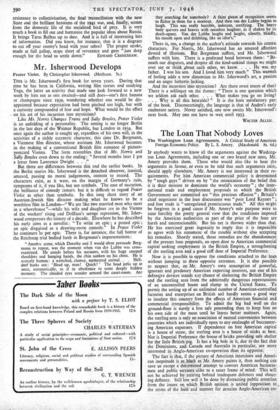Mr. Isherwood Develops
Prater Violet. By Christopher Isherwood. (Methuen. 5s.)
Tim is Mr. Isherwood's first book for seven years. During that time he has been in California, writing film stories and studying Yoga, the latter an activity that made one look forward to a new work by him not as one awaited—and still does—one's first banana or champagne since 1939, wondering whether one would be dis- appointed because expectation had been pitched too high, but with a curiosity compounded of fear and hope. What would be the effect . on his art of his incursion into mysticism?
Like Mr. Norris Changes Trains and Sally Bowles, Prater Violet is an unfolding of a personality. The setting is no longer Berlin in the last days of the Weimar Republic, but London in 1934. But once again the author is caught up, regardless of his own will, in the activities of a richly eccentric character, this time Dr. Bergmann, a Viennese film director, whose assistant Mr. Isherwood becomes in the making of a conventional British film romance of picture- postcard Vienna. The form resembles that of Mr. Norris and Sally Bowles even down to the ending : " Several months later I got a letter from Lawrence Dwight . . ."
But there are differences between this and the earlier books. In the Berlin stories Mr. Isherwood is the detached observer, ironical, amused, passing no moral judgements, content to record. The characters exist, as it were, on the margin of Germany's ruin, symptoms of it, if you like, but not symbols. The ease of narration, the brilliance of comedy remain, but it is difficult to regard Prater Violet as other than symbolic. In this long short story of an Austrian-Jewish film director making what he knows to be a worthless film in London—" We are like two married men who meet in a whorehouse "—while his wife and daughter are in the Vienna of the workers' rising and Dollfuss's savage repression, Mr. Isher- wood compresses the history of a decade. Elsewhere he has described his early aims as a novelist : " To write an epic ; a potted epic ; an epic disguised as a drawing-room comedy." In Prater Violet he continues to pot epic. There is, for instance, the full horror of the Reichstag trial bodied forth in Bergmann's impersonations: " Another scene, which Dorothy and I would often persuade Berg- mann to repeat, was the moment when van der Lubbe was cross- examined. He stands before his accusers, with his huge stooped shoulders and hanging hands, the chin sunken on his chest. He is scarcely human: a wretched, clumsy, tormented animal. . . Hell dorf barks out : Head up, man! Quick! ' The head jerks up at once, automatically, as if in obedience to some deeply hidden memory. The clouded eyes wander around the court-room. Are they searching for somebody? A faint gleam of recognition seems to flicker in them for a moment. And then van der Lubbe begins to laugh. This was really horrible, indecent, terrifying. The heavy body quivers and heaves with noiseless laughter, as if shaken by its death-agony. Van der Lubbe laughs and laughs, silently, blindly, his mouth open and dribbling, like an idiot's."
There is, too, a change in the- author's attitude towards his central characters. For Norris, Mr. Isherwood has an amused affection devoid of illusions. But Berpnann suffers, and Mr. Isherwood suffers with him. There is a. profound bond between them : " Be- neath our disguises, and despite all the kind-unkind things we might ever say or think „about each other, we knew. . . . He was my father. I was his son. And I loved him very much." This warmth of feeling adds a new dimension to Mr. Isherwood's art, a passion and an anger hitherto lacking.
And the incursion into mysticism? Are there overt traces of that? There- is a soliloquy on the theme: " There is one question which we seldom ask each other. . . . What Makes you go on living? . . . Why is all this bearable? " It is the least satisfactory part of the book. Disconcertingly, the language is that of Auden's early exuberant satires. Never satisfied, one now awaits Mr. Isherwood's next book. May one not have to wait, until 1953.
WALTER ALLEN.


























 Previous page
Previous page